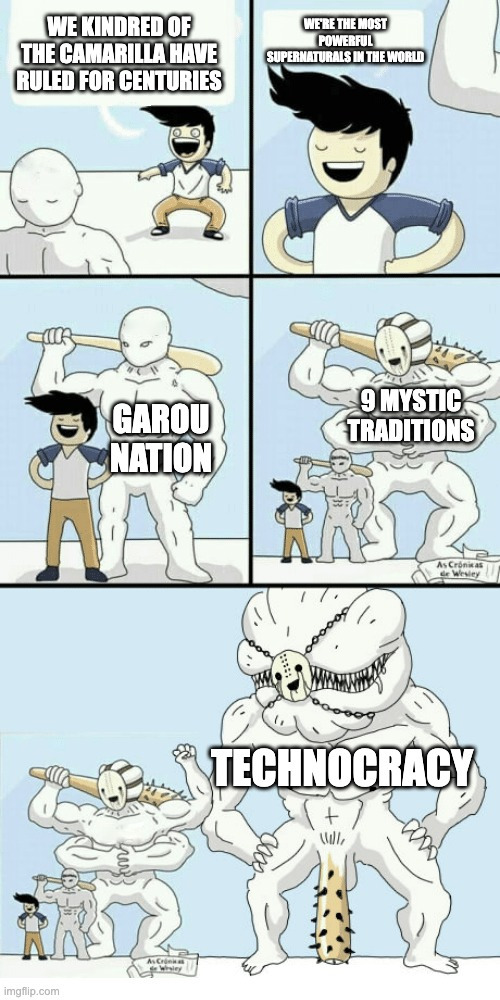#Mystical Union
Photo

Was it good for you, too?
Francesco Vanni’s painting of Catherine of Siena, made around 1590, is a good example of Christian mystical encounters portrayed in extremely physical ways.
“Especially women, but men too, described ecstatic experiences in which they nursed from Christ’s side wound as if it was a breast, or felt themselves penetrated by Christ, or so lost themselves in mystical adoration and abandonment that they experienced physical shuddering that seem most akin to orgasm,” art historian Martha Easton writes.
“The question is, how are we to interpret such experiences? Some would suggest that these are the Freudian yearnings of those who have often suppressed more typical human sexual experiences because of religious beliefs and practices. Others would argue that it is incorrect to assume that modern and medieval understandings of sexuality necessarily coincide; that in fact we must allow for an alterity to medieval people that allows phenomena of a deeply physical nature to be seen as spiritual. And still others would argue that it is possible that these types of experiences can be both religious and sexual, even erotic.”
Was It Good For You, Too? Medieval Erotic Art and Its Audiences by Martha Easton, 2008, Different Visions: A Journal of New Perspectives on Medieval Art
24 notes
·
View notes
Text
Mystic Odes 473
Rumi
At every instant and from every side, resounds the call of Love:
We are going to sky, who wants to come with us?
We have gone to heaven, we have been the friends of the angels,
And now we will go back there, for there is our country.
We are higher than heaven, more noble than the angels:
Why not go beyond them? Our goal is the Supreme Majesty.
What has the fine pearl to do with the world of dust?
Why have you come down here? Take your baggage back. What is this place?
Luck is with us, to us is the sacrifice!…
Like the birds of the sea, men come from the ocean–the ocean of the soul.
Like the birds of the sea, men come from the ocean–the ocean of the soul.
How could this bird, born from that sea, make his dwelling here?
No, we are the pearls from the bosom of the sea, it is there that we dwell:
Otherwise how could the wave succeed to the wave that comes from the soul?
The wave named ‘Am I not your Lord’ has come, it has broken the vessel of the body;
And when the vessel is broken, the vision comes back, and the union with Him.
2 notes
·
View notes
Text
In the Divine Embrace
A Journey Within and BeyondIn the vast, boundless expanse of existence, there lies a profound truth that whispers in the silent spaces of our being. It is a truth that transcends the confines of language and thought, yet is intimately known to each of us: the realization that we are intricately woven into the fabric of the divine.As seekers on this spiritual odyssey, we commence our quest from…

View On WordPress
#Divine Journey#Divine Presence#God Realization#Inner Awakening#Mystical Union#Non-Duality#spiritual odyssey#Spiritual Transformation
1 note
·
View note
Video
youtube
"Spiritual Canticle" by St. John of the Cross


A Spiritual Canticle of the Soul and the Bridegroom Christ ~by St. John of the Cross
https://youtu.be/k0ZHDI8kKhs?si=P4Z9FWFngPXokaU2 via @YouTube
#Enya #Mystical #Spiritual #Union #DivineLove #Heavenly #Christ #Christianity #Catholicism #NYC #Brooklyn #Queens #Bronx #StatenIsland #WashingtonDC #USA
1 note
·
View note
Text
Divine Whispers: Lord Shiva and Maa Parvati Romantic Wallpaper
Divine Duality: Lord Shiva and Parvati Love Story HD Image
Divine Whispers: Lord Shiva and Maa Parvati Romantic Wallpaper
Love’s Embrace: Lord Shiva and Maa Parvati Romantic HD Photo
Shiva-Parvati Devotion: Eternal Love Story HD Wallpaper
Mystical Union: Lord Shiva and Maa Parvati Romantic Image
Heavenly Serenity: Lord Shiva and Parvati Romantic Wallpaper
Lord Shiva and Maa Parvati Romantic…

View On WordPress
#HD Photo#Shiva-Parvati Devotion#Eternal Love Story#Mystical Union#Romantic Image#Heavenly Serenity#Divine Duality#Harmonious Balance#Lord Shiva#Love&039;s Complexity#Maa Parvati#Profound Mysteries#Romantic Wallpaper#True Love#HD Image#Ethereal World#Love Story.#Tenderness of Love.#Divine Devotion#Divine Whispers#Love&039;s Embrace
1 note
·
View note
Text
My favorite magic system from a game I haven't actually played is from Mage: the Ascension. It kind of fits as both a hard magic system and a soft magic system at the same time because there are some hard rules, but its mostly very open. To become a mage you have to realize that reality is not what it seems. In MtA, reality is whatever the majority of people believe it is, known as the consensus. The consensus in modern days is pretty uniform everywhere, with small variations based on where you are, but it used to be wildly different based on the cultural beliefs of the local people. A mage is a person who realizes that the consensus isn't true reality and gains to power to act outside of its rules. Any given mage's abilities come from their own personal view of reality, known as their paradigm. A mage's magic can do basically anything, as long as it is accounted for in their paradigm. So a mage who's paradigm includes the classic Aristotelian elements can perform magic based on that, but if their paradigm doesn't include animistic spirits then they can't commune with those spirits even though other mages could based on their own paradigm. The problem with this is that the consensus doesn't like it when you go around breaking its rules and will punish mages by slapping them with an effect called paradox. Paradox can be anything from a spell failing to getting shunted into your own personal pocket universe. Nothing generates paradox like being seen doing magic by sleepers (people who are not mages and still live fully within the consensus). Most mages either only use magic around other mages or, if they need to cast around sleepers, will disguise their magic as a mundane effect. Someone throwing a fireball from their hands will generate major paradox because the consensus is that people can't do that. However if a mage holds a lighter up to a spraycan before casting their fireball, the sleepers can rationalize it as something that exists within the consensus and not as much paradox will be generated.
In the dark ages, magic was part of the consensus and mages could openly rule over the sleepers because everyone believed in magic and therefore magic was part of the consensus. In response to the tyranny of the mages, a group was formed called the League of Reason, who wanted to introduce a new form of magic to the consensus that everyone could use. This form of magic was based on logic and reason and was called science. This led to the ascension war, where the League of reason sought to remove magic and superstition from the consensus and a very loose coalition of mages called the Council of Nine Mystic Traditions want to keep magic in the consensus. And the League of Reason won. A mostly rationalistic, scientific worldview has become the consensus worldwide, forcing the Council into operating underground. The League of Reason has become the Technocracy, a worldwide secret organization ruling the world from the shadows and trying to stamp out magic and any other form of "reality deviants" to keep humanity safe, even if they have to suppress basic human imagination to do so. Notably, the earliest books for the game very much said "Traditions good, Technocracy bad", but later books went for a much more grey approach to the conflict between them, making it clear that both sides really are doing what they think is in humanity's best interest even if their ideas for how to do so are fundamentally incompatible.
What's really interesting is that science and technology really are a form of magic and technocrats are mages, even if the Technocracy would vehemently deny this. Technology is a form of magic that everyone can use because its part of the consensus and science doesn't discover new facts about the world, It creates those facts and applies them to the world. The Technocracy's super-advanced technology creates paradox just as much as magic does because personal anti-gravity suits and mass-produced clones violate the consensus just like throwing around fireballs and conjuring demons does.
Mage: the Ascension is a super fun setting because just about any fantasy or sci-fi trope can exist here. Classic pointy hat and wand wizards can battle cyborgs armed with self-replicating nanotechnology. Anti-authoritarian punks can hack your wallpaper to spy on you because they believe all reality is part of a unified mathematical whole that the internet gives us access to. A group of spacefarers can ride the luminiferous aether to mars only to encounter Aztec shamans who asked the spirits to carry them there thousands of years ago. A powerful mage can create a time loop by convincing their younger self to obtain enlightenment through the power of sex, drugs, and rock and roll. Two people can have an argument over whether the guy they just met was an alien from Alpha Centauri or an elf from the Norse nine realms and both of them can be right. Animistic spirit-callers can upload themselves to the internet to combat spirits of malware. And an angry mage might just teleport you into the sun because they believe distance is just an illusion and therefore have the power to make anything go anywhere with a thought. It's a wild ride.
#mage the ascension#tabletop games#ttrpg#world of darkness#old world of darkness#magic system#mage#fantasy#science fiction#technocracy#technocratic union#council of nine mystic traditions#lore
95 notes
·
View notes
Text


murphyyy my new fave guy
73 notes
·
View notes
Text

“The torch is not the flame, nor is the flame the torch. They are united to each other, but first the flame is of the torch. You are the torch and He makes you become light. The light that shines is His light; you will consume yourself for Him; you must live for Him and in Him. Therefore, you are the flame that shines, and the flame that shines is of that light which is He.”
~From Before The Dawn
(Art via viecontemplative.saintefamille.fr)
#torch#flame#God#light#You are His torch#live for God#mystical union with the Lord#Jesus Christ#theosis
12 notes
·
View notes
Text
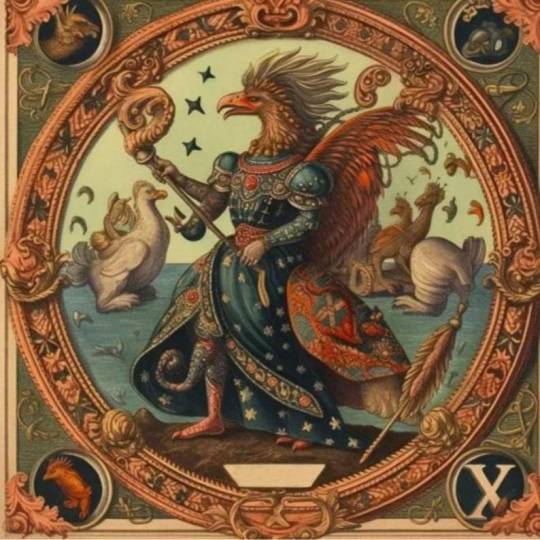
Abraxas is the sun, and at the same time
the eternally sucking gorge of the void,
the belittling and dismembering devil.
The power of Abraxas is twofold; but ye see it not, because for your eyes the warring opposites of this power are extinguished.
What the god-sun speaketh is life.
What the devil speaketh is death.
But Abraxas speaketh that hallowed and acursed word which is life and death at the same time.
Abraxas begetteth truth and lying, good and evil, light and darkness, in the same word and in the same act.
Wherefore is Abraxas terrible.
It is splendid as the lion in the instant he striketh down his victim.
It is beautiful as a day of spring.
It is the great Pan himself and also the small one. It is Priapos.
It is the monster of the under-world, a thousand
armed polyp, coiled knot of winged serpents, frenzy.
It is the hermaphrodite of the earliest beginning.
It is the lord of the toads and frogs, which live in the water and go up on the land, whose chorus ascendeth at noon and at midnight.
It is abundance that seeketh union with emptiness.
It is holy begetting.
It is love and love's murder.
It is the saint and his betrayer.
It is the brightest light of day and the darkest night of madness.
To look upon it, is blindness.
To know it, is sickness.
To worship it, is death.
To fear it, is wisdom.
To resist it not, is redemption.
God dwelleth behind the sun, the devil behind the night. What god bringeth forth out of the light the devil sucketh into the night.
But Abraxas is the world, it's becoming and its passing.
Upon every gift that cometh from the god-sun the devil layeth his curse.
Everything that ye entreat from the god-sun begetteth a deed of the devil.
Everything that ye create with the god-sun giveth effective power to the devil.
That is terrible Abraxas.
It is the mightiest creature, and in it the creature is afraid of itself.
It is the manifest opposition of creatura to the pleroma and its nothingness.
It is the son's horror of the Mother.
It is the Mother's love for the Son.
It is the delight of the earth and the cruelty of the heavens.
Before its countenance man becometh like stone.
Before it there is no question and no reply.
It is the life of creatura.
It is the operation of distinctiveness.
It is the love of man.
It is the speech of man.
It is the appearance and the shadow of man.
It is illusory reality.
Seven Sermons - Carl G Jung
‘The bird struggles out of the egg. The egg is the world. Whoever wants to be born, must first destroy a world. The bird flies to God. That God’s name is Abraxas’ —
Demian, Herman Hesse
#occultism#gnosticism#mysticism#esoteric#art#carl jung#red book#abraxas#sophia#divine union#androgynous#hermaphrodite
19 notes
·
View notes
Text
"Modern society has developed a culture that emphasizes activity over contemplation through the creation of urban spaces full of noise and distraction and of an atmosphere filled with information and advertising, which bombard us all the time. This prevailing atmosphere serves to turn the soul evermore outward and away from its center. Inner peace has become more difficult to attain because ofthe hectic life that characterizes the human condition in much of the world today."
— Dr. Seyyed Hossein Nasr
#islam#modernism#modern society#industrialization#capitalism#late capitalism#labor unions#mysticism#inner peace#sufism#sufi islam#excerpt#quote#muslim
36 notes
·
View notes
Text
IT TAKES TWO TO DISCUSS UNION
Ladies and gentlemen,
Let’s do like Bob Ross and start painting
Our own happy little Trees of Life.
Today, I invite you to embark on a transformative journey into the depths of polarity, where the dance of Chesed and Gevurah unfolds, revealing profound insights about the nature of existence. Prepare to explore the enchanting tapestry of creation,
With one simple instruction in mind:
“We can’t discuss Aleph without Bet.”
It sounds like one of those simple Simon Things to say but I’m not being vague. Let us start with Aleph in relation to chesed. Here we find the sacred name El, A singular name for God, resonating with the divine light of loving kindness.
El stands as a luminous gateway, bridging the celestial realms with our human understanding.
It reminds us of the radiant illumination that burst forth on the first day of creation, as the Infinite spoke, "Let there be light!" This divine essence, Chesed, the boundless loving-kindness, ignites our hearts and leads us towards compassion.
But as we delve deeper into the cosmic play, we encounter Bet.
Bruh! Moshe started Genesis with Bereshit Bara ELoHIM for a reason.
See the name ELoHIM, which also represents Gevurah, the divine attribute of strength and restriction Is plural.
Well, in Genesis it’s used as a singular because it acts like one but that’s a whole different can of worms.
When it comes to Gevurah, It’s because on the second day of creation that ELoHIM,
with its firm presence, separated the waters above from the waters below,,
It’s a glimpse at the cosmic dance of the supernal triad—Keter, Chockmah, and Binah—as the celestial currents that intertwine with the earthly realm,
In that sense that everything is held together by the enigmatic forces of dark matter and energy.
This essentially
introduces a profound division—
touching on tzimtzum and the necessary restriction that harmonizes the dance of polarity.
Through this act, ELoHIM urges us to embrace both the expansive loving kindness of Chesed and the discernment of Gevurah.
It is through the interplay of Chesed and Gevurah that we uncover the true depths of insight, and navigate the currents of divine revelation.
In the Psalms of King David, we find echoes of the connection between Gevurah and ELoHIM. As David sings, "The Lord reigns; let the earth rejoice; let the multitude of isles be glad thereof. Clouds and darkness are round about him: righteousness and judgment are the habitation of his throne."
These verses beautifully capture the awe-inspiring presence of ELoHIM, the divine power that governs with righteousness and judgment.
In our human experience, we often grapple with the notion of fairness, questioning why life doesn't always appear just, and yet, deep within us resides a natural aversion to passing harsh judgments, for we sense the intricate interplay of polarities and the unfolding of divine wisdom that transcends our limited perceptions.
So, my friends, as we venture into the realm of polarity, let us honor the sacred dance between Chesed and Gevurah, symbolized by the letters Aleph and Bet. They represent the profound interconnectedness of the universe and the rich tapestry of our own existence.
Let’s contemplate their meaning, and from that contemplation, allow ideas and insights bloom.
Can you discuss one without two?
I’ll wait…
You with me now? Alright…
Without Bet, we cannot discuss Aleph, for Aleph represents the unity and oneness of the divine, while Bet signifies duality and the beginning of the manifested world.
This division introduces a profound polarity, illustrating the necessary restriction that harmonizes the dance of existence.
Imagine, if you will, the dance of existence. The swirling interplay of unity and duality, resonating throughout the cosmos.
This dance is not confined to the grand stage of the universe alone, but reverberates within the deepest recesses of our own being.
As you sit in quiet contemplation, allow your inner dialogue to embrace the dance of polarity.
Observe the thoughts and emotions that arise, the ebb and flow of light and shadow.
For it is in this theater of the mind that we find the fertile ground for profound realization.
By meditating upon the interplay of Aleph and Bet, we open the gateway to union, a transcendence of the apparent duality. Embrace the paradox, the tension, and the harmony within, and witness the profound integration of your own existence.
Now then, fellow travelers, as we turn our gaze to the outer world,
let us approach it with the wisdom born from inner exploration.
As you navigate the intricate web of relationships and experiences, see the dance of polarity reflected in the tapestry of everything.
Embrace the diversity of perspectives, the interplay of light and dark, and the inherent tension within the grand symphony of existence.
Like I can’t hear you unless you
speak.
This is why we should cultivate a deep sense of empathy and understanding, and recognize that unity and duality are not adversaries, but partners in the cosmic dance.
Let that awareness guide our actions, your interactions, and our connection to the world.
As we harmonize with the dance of Aleph and Bet, we become agents of unity, weaving threads of compassion, love, and acceptance into one and all.
This spiritual journey of self-discovery
Is a collective awakening.
That’s the lesson within the realms of polarity.
It’s that transformative power to unite the seen and unseen, the known and unknown, that unfold into a dance
Amidst the symphony of life.
May you walk the path of harmony, honoring the divine qualities of love and discernment within your own being, and radiate their transformative power into the world.
Embrace the dance, embrace the journey, and embody the unity that permeates all creation.
Cuz it’s all love.
#mysticism#chesed#Gevurah#polarity#divine union#kabbalah#writing#spirituality#inner transformation#wisdom#philosophy#esoteric wisdom#dualism#moving beyond#all is one
17 notes
·
View notes
Text
On the Inexorable Realities of Disillusion and Abandon
The paths of contemplation and mysticism have never been for the masses. Rather, these are paths that open only to those who find themselves exiled by the exoteric machinations of religion and culture at large.
But not just that.
Stillness and silence of the heart are not truly states to be cultivated, they are inexorable realities born of disillusion and abandon.
The practices of contemplation and mystical exploration are what one takes up when they find themselves already in the desert, through the grace of reality unfurling to their uniquely attuned lenses.
In this, the mystical and contemplative paths require little evangelism; small sign posts of others being of like mind are quite sufficient for the lonely wanderers ready primed to find wise companionship.
The mystics and contemplatives are not threatened by the increasing irrelevance of the bastion institutions of consumer spirituality falling prey to the secular gods of modernity, who (if we’re being honest) have far more tangible workings in this world than the petrified tribal deities of antiquity have ever really exercised.
Contemplation and mysticism are not paths beyond the impulse toward the sacred that spark wherever genuine wonder and mystery find themselves the subject of conscious attention, indeed these paths and ways of being can translate and fan those sparks into all consuming fires of gnosis and union.
Usually though, such flames are but threats to the dry wooden rafters that shield institutionalized spirituality from both reality and relevance.
So, wandering in stillness it is, sitting by the fire, feeling its heat, and knowing. That’s enough.
~Sunyananda

#zen#buddhism#buddha#buddhist#dharma#enlightenment#sangha#awakening#nirvana#spirituality#gnosis#union#religion#religious#spiritual#mystic#mysticism#mystical#contemplative#contemplation
2 notes
·
View notes
Text
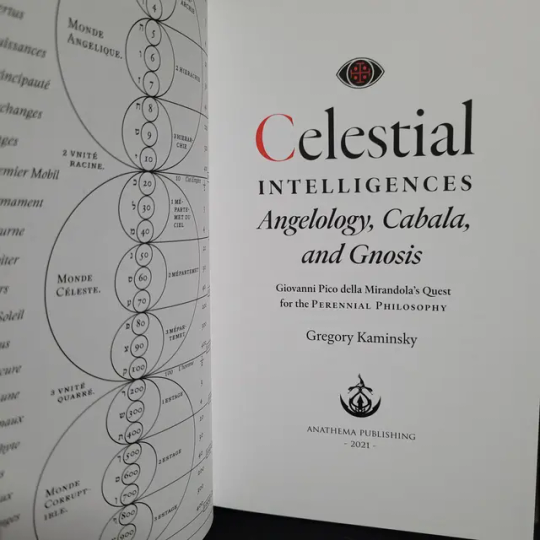
“With its roots in Jacob’s ladder and elaborated in biblical Jewish merkavah mysticism, the doctrine known later in Greek as theosis is found in the writings of Dionysius the Areopagite, and Symeon the New Theologian, as well as the Jewish Kabbalah as demonstrated by Joseph Karo, the Baal Shem Tov and his disciples. In other words, Pico intends his angelology in these two works to be understood by the learned classes throughout Europe as a prescription to achieve union with the divine.
By “divine union,” what is meant? The final snapshot of this arduous and paradoxical, or perhaps even inconceivable journey is different in various traditions. Different from the ecstatic, fiery, yet agonizing transformation of the prophet Enoch into the archangel Metatron, called “a lesser YHVH” in 3 Enoch,7 or the graphic, luminous transformation of the mystical abbot of St. Mammas Monastery in Constantinople, Symeon the New Theologian (949–1022), into the Body of Christ in the tenth century CE,8 Pico’s vision of theosis was more akin to sharing God’s “mind stream.” That is, instead of a merger of the corporeal human aspirant into the incorporeal infinitude of the godhead, theosis for Pico was a kind of gnosis and a point of view that was simultaneously individuated and collectively unified. This can be seen in his description of ultimate divine union as possible while the philosopher is incarnate, more akin to a supremely exalted state of consciousness. While achieving a state like this necessitated neglect of bodily cares and desires according to Pico, he also asserted that this prescriptive formula for divinization actually purified the body as a dwelling place for the divine presence.”
Celestial Intelligences: Angelology, Cabala, and Gnosis: Giovanni Pico della Mirandola's Quest for the Perennial Philosophy
#Perennial Philosophy#Divine Union#Gnosis#Theosis#Merkavah mysticism#Giovanni Pico della Mirandola#Divinization#Angelology#Celestial Intelligences#The esoteric tradition of the West#Kabbalah#Magic#Cabala#Christian Cabala#The orders of Angels#Jacob’s ladder#Dionysius the Areopagite#Symeon the New Theologian#Union with the Divine#Archangel Metatron#Picos vision of Theosis#The process of Spiritual Ascension#Kabbalistic Tree of Life#Angelic Hierarchy#The Cosmic Hierarchy#Renaissance Philosophy#Philosophical Wanderings
2 notes
·
View notes
Video
youtube
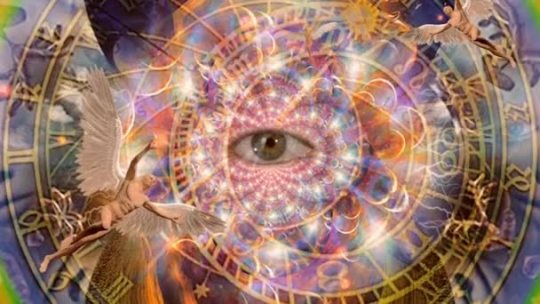
One Hour Pange Lingua Gloriosi - Catholic Hymn - Gregorian Chant - Extended
1 note
·
View note
Text
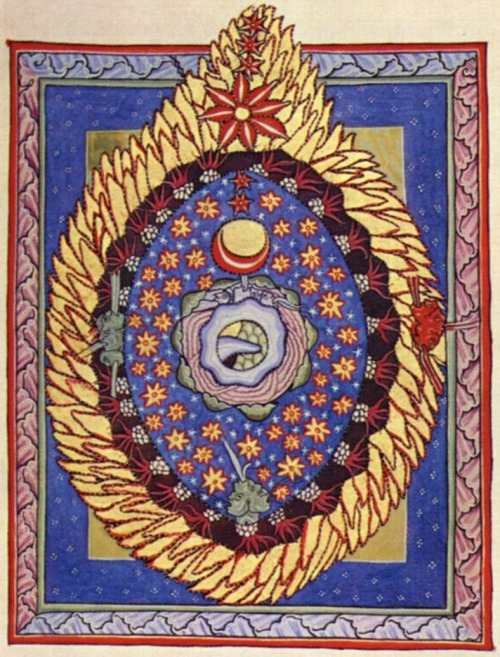
“If then you do not make yourself equal to God, you cannot apprehend God; for like is known by like.
Leap clear of all that is corporeal, and make yourself grown to a like expanse with that greatness which is beyond all measure; rise above all time and become eternal; then you will apprehend God. Think that for you too nothing is impossible; deem that you too are immortal, and that you are able to grasp all things in your thought, to know every craft and science; find your home in the haunts of every living creature; make yourself higher than all heights and lower than all depths; bring together in yourself all opposites of quality, heat and cold, dryness and fluidity; think that you are everywhere at once, on land, at sea, in heaven; think that you are not yet begotten, that you are in the womb, that you are young, that you are old, that you have died, that you are in the world beyond the grave; grasp in your thought all of this at once, all times and places, all substances and qualities and magnitudes together; then you can apprehend God.
But if you shut up your soul in your body, and abase yourself, and say “I know nothing, I can do nothing; I am afraid of earth and sea, I cannot mount to heaven; I know not what I was, nor what I shall be,” then what have you to do with God?”
― Hermes Trismegistus, Hermetica: The Greek Corpus Hermeticum and the Latin Asclepius
#analogy#principle of analogy#as above so below#hermetica#corpus hermeticum#Hermetic#hermeticism#hermetic philosophy#charles darwin and the hermetic tradition#marx and mysticism#Karl Marx and Human Self Creation#God#immanentism#History of Philosophy#history of science#as within so without#Alchemy#buddhism#divine union#mysticism#meditation
44 notes
·
View notes
